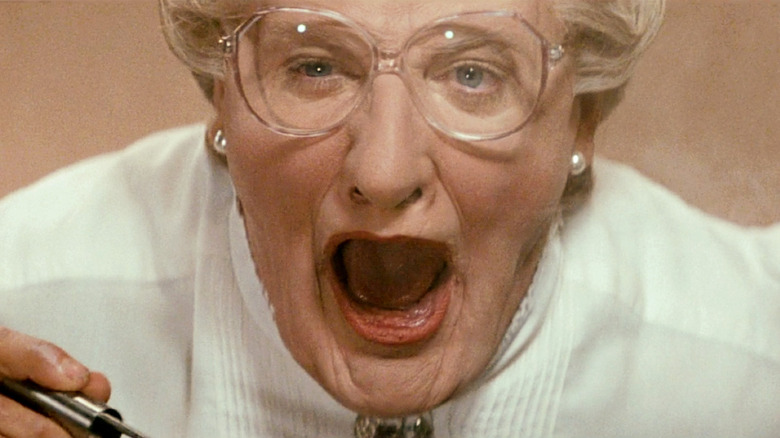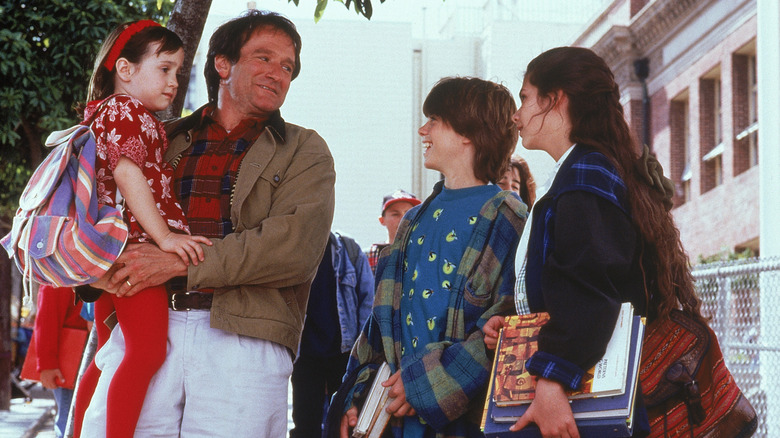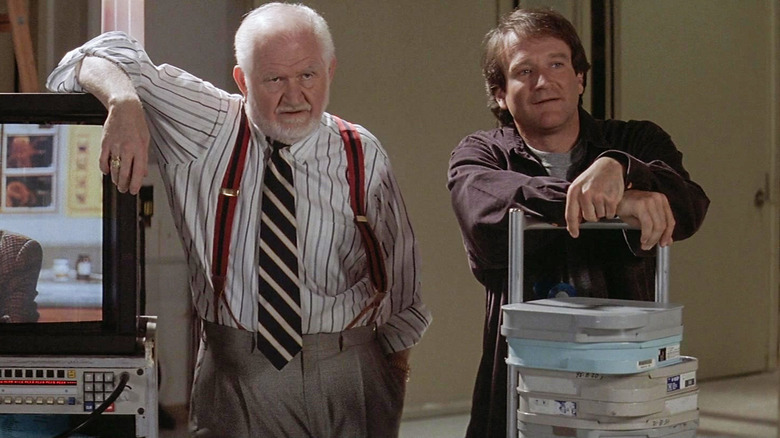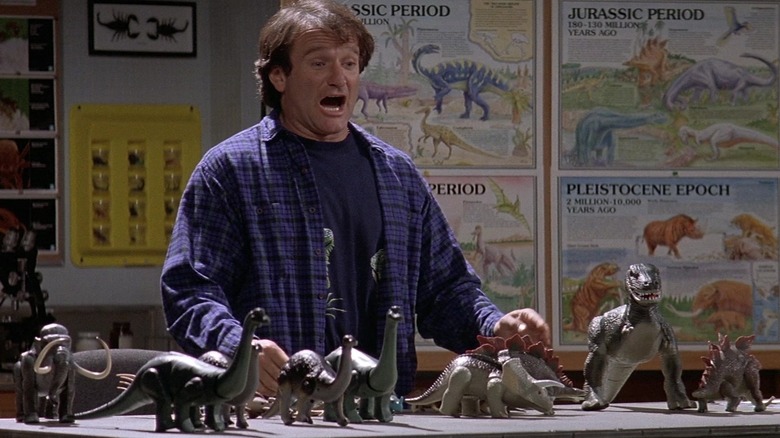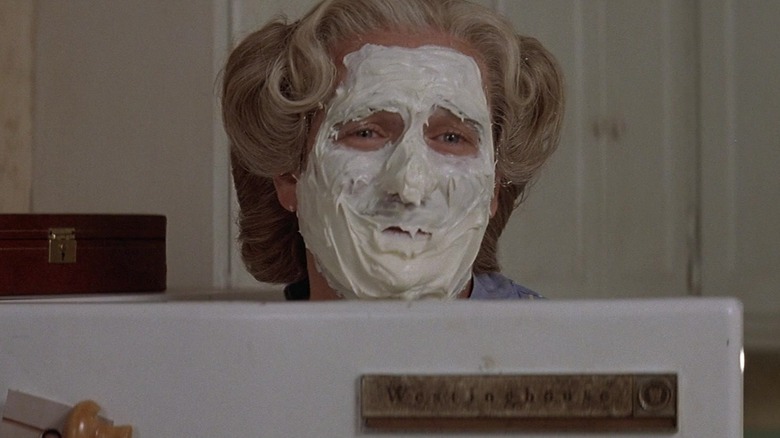30 Years Ago, Robin Williams' Mrs. Doubtfire Was The Hottest Nanny At The Box Office
(Welcome to Tales from the Box Office, our column that examines box office miracles, disasters, and everything in between, as well as what we can learn from them.)
"The goal for me, always, is try to make a movie that feels timeless, that people will watch years from now," said "Mrs. Doubtfire" director Chris Columbus in a recent interview with KTVU.
The character of Mrs. Doubtfire actually has her roots in a real person — not a recently-divorced father pulling a desperate gambit to see more of his kids, but the owner of a second hand clothing shop in Edinburgh. The shop was called Madame Doubtfire and, colloquially, so was its owner, though her name after remarrying was Annabella Coutts. She was something of a local legend, with one Edinburgh resident recalling that she had "about half a dozen cats" and that while her shop was an excellent resource for high-quality second hand goods, "you had to hold your nose the whole time, because it stank to high heavens of cat pee!"
One person who encountered Mrs. Coutts' quaint little shop was author Anne Fine, who decided to borrow the name for her 1986 novel, "Madame Doubtfire." Speaking on The Road To Cinema podcast, screenwriter Randi Mayem Singer recalled reading the novel for the first time and thinking, "'Well, this is such a movie.' I was always a big fan of 'Tootsie' and 'Some Like It Hot,' but this was ... The guy puts on a dress for a really universal, relatable reason. To be with his kids."
The film: Mrs Doubtfire
"Mrs. Doubtfire" hit theaters in November 1993, at the height of Robin Williams' well-earned stardom. The unstoppable improv comedy master had kicked off the decade with his second Oscar nomination (for "Dead Poets Society"), scored his third nomination soon after (for "The Fisher King"), and before the '90s ended he would finally take home a golden statuette (Best Supporting Actor, for his role in "Good Will Hunting"). From "Good Morning Vietnam" to "Hook," Williams had been firmly established as a box office draw: point a camera at him, and magic would happen. He improvised so much on "Mrs. Doubtfire" that director Chris Columbus ended up shooting almost 2 million feet of film.
But what really clinched "Mrs. Doubtfire" as not only one of the biggest movies of 1993, but a film that still holds up decades later, was Williams' gift for blending comedy with drama. He plays Daniel Hillard, an intermittently-employed voice actor whose impulsive, fun-loving nature creates chaos for his breadwinner wife, Miranda (Sally Hillard). When an impromptu birthday party ends with Miranda coming home to a house full of farm animals, it's the last straw. Telling Daniel that they bring out the worst in each other, Miranda files for divorce. Daniel moves to a shabby apartment and, with no stable source of income, the judge rules that he can only visit his children once a week until he gets his life sorted out.
Eager to see more of his kids, Daniel gets not just one job, but two. The second job is as a nanny for his children, disguised as the softly-voiced and generously-bosomed Mrs. Doubtfire. The situation is ridiculous but, as Singer observed, it's kept grounded by the enormous love that Williams' character has for his children, and also in one of the most realistic portrayals of divorce to date.
Talking to kids about divorce
During the decade leading up to the release of "Mrs. Doubtfire," divorce rates in the United States had peaked, with an estimated 50% of marriages ending in a split. Before "Mrs. Doubtfire," the best known kids' movie to tackle the messy topic of divorce was 1961's "The Parent Trap," which ends with its mischievous identical twins succeeding in driving off their dad's gold-digging fiancée and getting their parents back together. When it was remade in 1998, with Lindsay Lohan pulling double duty as the twins, that happy ending was kept intact. But it wasn't an ending that reflected the experiences of most children of divorced parents.
"Mrs. Doubtfire" director Chris Columbus says there was a firm, united belief that the movie should not end with Daniel and Miranda rekindling their marriage. "Robin [Williams], Marsha [Grace Williams, producer], and myself, we were a strong trio about that," Columbus told Business Insider. "We were adamant with the studio that they would never get back together. Most divorced parents never get back together and we didn't want the film to have a false ending."
The film also sees a potential stepdad enter the picture: Stu, a smooth-talking charmer played by a pre-Bond Pierce Brosnan. But while Daniel sees Stu as a threat and does his best to drive him off, even going so far as to deliberately trigger Stu's lethal pepper allergy, Stu himself is no villain. In fact, an overheard conversation at a bar reveals him to be a perfect gentlemen who not only has the best of intentions with Miranda, but also genuinely adores her kids. It's a stark contrast to the evil would-be stepmother of "The Parent Trap."
The financial journey
"Mrs. Doubtfire" was a firmly mid-budget family movie of the sort that would probably be sent directly to streaming these days. Produced for $25 million (around $53 million in 2023 dollars), it opened on Thanksgiving weekend with a three-day gross of $20.4 million, and dropped just 28% in its second weekend. Its sustained popularity over the following weeks not only kept it in theaters but led to an expansion onto even more screens, and "Mrs. Doubtfire" ultimately remained in the top five for 11 consecutive weekends. Even this year's box office juggernaut, "Barbie," didn't quite manage that.
By the end of its theatrical run, "Mrs. Doubtfire" had grossed a staggering $441.2 million worldwide, more than 17 times its original budget, and roughly equal to $930 million in 2023 dollars. Yes, a family comedy about a man dressing up as an old woman and dancing around with cleaning appliances had crept up on the equivalent on 1993's equivalent of the billion dollar mark at the box office. Oh, and it had also won a (very well-deserved) Oscar for Best Makeup.
In the 1993 worldwide box office rankings, "Mrs. Doubtfire" came second only to "Jurassic Park." Yet despite its monumental success, no sequel was ever made; Williams never heard a story idea that he believed to be worthwhile, and since Williams was the heart and soul of "Mrs. Doubtfire," any sequel without him wouldn't have been worth doing. Columbus revealed to Business Insider that the last conversation he ever had with Williams was about a potential sequel, but the actor's death that same year put an end to those plans.
As for whether or not "Mrs. Doubtfire 2" might still happen anyway. "The studio can do whatever they want with it," said Columbus. "Should they? God no. I will certainly be very vocal about it if they decide to do [a sequel]."
The lessons contained within
The handy thing about "Mrs. Doubtfire" is that it comes pre-packaged with its own lessons, delivered by Williams himself. Amid a chaotic dinner meeting with network boss Mr. Lundy (Robert Prosky), Daniel offers his guiding philosophy for entertaining children:
"Bottom line: don't patronise kids. They're little people. You gotta personalize it. Make it fun. If it's something you'd enjoy, they'd enjoy it."
This is true of "Mrs. Doubtfire," and also of Chris Columbus' hit from a few years earlier, "Home Alone." In fact, many of the greatest (and highest-grossing) kids' movies of all time are equally enjoyable to watch as an adult — from "The Princess Bride" to "Shrek." While there's a natural instinct to protect children from darkness and conflict, those are classic ingredients of storytelling and they're as appealing to kids as they are to adults. Movies are an opportunity to let kids wrestle with difficult or upsetting emotions within the safe confines of fiction — whether it's the parents getting a divorce in "Mrs. Doubtfire," Willy Wonka shouting at Charlie Bucket in "Willy Wonka & the Chocolate Factory," or Artax sinking into the Swamp of Sadness in "The Neverending Story."
You don't have to play down to 'em. Just play to 'em.
